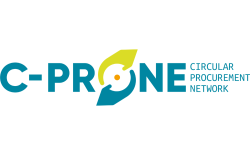Why circular procurement?
Public Procurement
Public procurement refers to the process by which public authorities, such as government departments or local authorities, purchase work, goods or services from companies (DG GROW).
Each year, public authorities across the EU allocate approximately 14% of the GDP (about €2 trillion annually) towards purchasing services, works, and supplies. In key sectors like energy, transport, waste management, social protection, and health or education services, public authorities serve as the primary buyers. As a result, public procurement can be used strategically to achieve broader policy goals, stimulating jobs, foster growth and investment, and drive the creation of a more innovative, resource- and energy-efficient, and socially inclusive economy.

Circular Procurement
Circular procurement is a key instrument in advancing towards a circular economy by ensuring that products, components, and materials are repurposed efficiently, retaining their value within closed loops. While various definitions of circular procurement exist, the ProCirc project defines it as follows:
‘’Circular procurement considers the whole life-cycle of goods and services, in order to avoid negative impacts and waste creation, and achieve an overall reduction in the amount of energy and materials consumed. Including circular principles in procurement helps procurers take a more holistic approach to sustainability and accelerate the transition of supply chains to a more circular economy.’’




